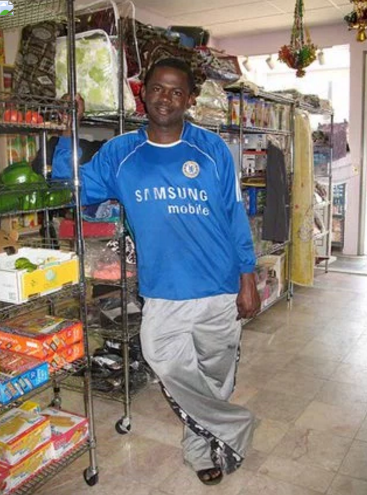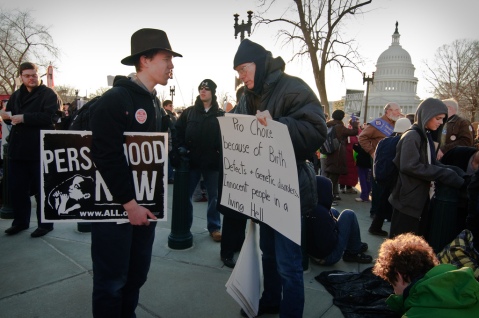Introduction from the APLA President
THIRD INSTALLMENT, SPEAKING JUSTICE TO POWER: APLA / POLAR RESPOND TO THE TRUMP EXECUTIVE ORDER ON IMMIGRATION
In response to the Trump administration’s Executive Order 13769, barring U.S. entry to citizens of seven countries as well as legally recognized refugees, PoLAR and APLA commissioned a series of responses from scholars working on the politics and law of borders and migration. On February 21, 2017, Homeland Security Secretary John Kelly issued additional plans and guidance for implementing executive orders on immigration, raising fears of more expansive deportation operations. This third installment features work by Catherine Besteman, Anne Knight, Nikolas Kosmatopoulos, Sara Shneiderman, and Sharika Thiranagama, Visit our series page to access posts as they are published, and links to PoLAR content and scholarly articles by contributors.

Last Thursday I experienced first hand the U.S.’s vast ideological divide. In the afternoon, I gave an author talk to a book club based at a local university who had read my book about Somali refugees in Maine. In the evening I attended a talk at the same university by a conservative Maine State Representative titled “Alien Invasion.” The two events captured the stark discord in the U.S. about immigration and left me breathless with the extent to which we are truly polarized as a nation.
My book, Making Refuge: Somali Bantu Refugees and Lewiston, Maine, is about the journey taken by Somali refugees from southern Somalia to the vast refugee camps in Kenya, through the resettlement programs that spread them throughout the U.S., to their ultimate destination in Lewiston, Maine. The book club members – mostly older, retired, white – wanted to talk about ways in which they could support new immigrants like those portrayed in the book, as Maine continues to welcome immigrants from Syria, Iraq, Congo, Burundi, and elsewhere. Audience members shared their efforts to date: volunteering at local non-profits that run story-telling or art projects with immigrant youth, helping at a food pantry in an immigrant neighborhood, coordinating furniture collections and donations to new immigrants, trying to help immigrants locate employment, inviting new immigrant families to dinner.
They were an earnest audience, dedicated to the concept of offering refuge and welcoming the stranger, committed to an understanding of the U.S. as a place of protection and opportunity for immigrants. Questions ranged from how to avoid white liberal ‘do-gooder’ interventions that disempower immigrants to actions that faith communities might undertake to support newcomers. One woman volunteered that members of her church congregation were learning French to support newly arrived congregants from the Congo with limited English proficiency. The room hummed with disapproval of President Trump’s Executive Orders banning immigrants from seven Muslim majority countries and all refugees, as well as worry for those caught in conflict zones who would be barred by a reinstated refugee ban.
The evening event, in contrast, featured a speech by Maine State Representative Larry Lockman, known for a history of sexist and homophobic proclamations. With this speech he was asserting himself as a leading anti-immigrant voice in Maine, seeking support for his proposed new legislation to require cities in Maine to comply with Trump’s reinstated ‘Secure Communities’ Executive Order or lose all federal and state funding, and to hold local refugee resettlement agencies accountable for any criminal actions by those to whom they had offered assistance.
To convince his audience of the dangers posed by immigration, Lockman listed acts by immigrants that harmed or might have harmed Americans: the two Iraqi men in Bowling Green, Kentucky, found guilty of attempting to provide weapons to Al-Qaeda in Iraq; two immigrant men who passed through Maine before leaving the country to join ISIS; a brutal murder of a man in Portland by three men who may have been immigrants; and, of course, 9/11. The convoluted logic stringing these tragic events together seemed to be that the U.S. should bar immigrants because some might become radicalized or commit crimes after immigrating.
In addition to immigrant criminality, Lockman also insisted that immigrants benefit from public assistance to which they should not be entitled, stating (with no evidence) that Maine’s estimated 5,000 illegal aliens use $41 million in public funds each year. The supposedly illicit use of taxpayer dollars is a resounding trope in Maine, trotted out by the conservative Governor in efforts to defund everything from food stamps to Medicaid to public education. Maine’s poverty rate, and the economic devastation left by the state’s abandonment by manufacturing, ensures that feelings about entitlements run high.
To my ears, the speech was an exercise in fear-mongering and misinformation. His supporters in the audience loved it.

After people lined up at the microphones to pose questions, the room exploded as audience members with opposing views jeered and yelled at those with whom they disagreed to “Shut up and sit down!” A young man who said he lost his father in the World Trade Center attacks of 9/11 protested Lockman’s use of the tragedy to foment hate. When he shared that his response to the attacks was compassion rather than retribution, agitated audience members loudly booed. When another woman invited Lockman to dialogue with her community of immigrants and asked him to talk about white fragility, he angrily responded, “Next question!” As the hollering escalated into unruliness, the event organizer finally turned off the mics and broke up the gathering. The audience members filed out of the room still divided between those supportive of and appalled by Lockman’s agenda – nothing approaching consensus or mutual understanding had emerged.
I left the meeting thinking about the role of anthropology in the midst of such deep disagreement.
These two versions of the nation – the one as a refuge for immigrants, the other as a fortress against immigrants – draw inspiration from two different understandings of humanity. Are humans compassionate or judgmental? Are humans welcoming or self-protective? Is sharing a virtue or a weakness? Are humans self-protectively insular or inclined to sociality? Have humans historically offered care to needy strangers or pushed them away?
The power of anthropology, it seems to me, is to offer a vision of humanity that gives people purchase: a mirror in which they can recognize themselves and their motives, confront their fears, confirm their longings. People living in a world ravaged by neoliberal economics and ideology – the hollowing out of communal life, the disinvestment in public goods and services, the turn toward punitive forms of justice, the abandonment of the non-profitable, the drive toward economistic quantification, the forging of identity through consumption, the valorization of financial winners and the sacrifice of financial losers – have saturated into a single version of humanity that promotes radical self interest, exclusivity, hoarding, resentment, and mistrust. This is the version of humanity that nurtures xenophobic nationalism, border walls, and the condemnation of compassion. This is the Trump version.
But anthropologists have very different stories to tell about human care, mutuality, solidarity, altruism, commitments to the common good, resilience, and resistance. These are the stories we need to be telling now, with the loudest megaphones we can find.
 Catherine Besteman teaches anthropology at Colby College. Her research focuses on immigration/mobility, militarism, sovereignty/citizenship, and racism, topics she has studied in South Africa, Somalia, and the US. Her books include Making Refuge: Somali Bantu Refugees and Lewiston, Maine (2016), Transforming Cape Town (2008), Unraveling Somalia (1999), and the edited volumes The Insecure American (2009), Why America’s Top Pundits are Wrong (2005), and Violence: A Reader (2002). A 2012 Guggenheim Fellow, her work has also been supported by the Rockefeller Foundation, the American Council of Learned Societies, the Wenner Gren Foundation, the American Philosophical Society, Sigma Xi, the School of Advanced Research, and the Tinker Foundation.
Catherine Besteman teaches anthropology at Colby College. Her research focuses on immigration/mobility, militarism, sovereignty/citizenship, and racism, topics she has studied in South Africa, Somalia, and the US. Her books include Making Refuge: Somali Bantu Refugees and Lewiston, Maine (2016), Transforming Cape Town (2008), Unraveling Somalia (1999), and the edited volumes The Insecure American (2009), Why America’s Top Pundits are Wrong (2005), and Violence: A Reader (2002). A 2012 Guggenheim Fellow, her work has also been supported by the Rockefeller Foundation, the American Council of Learned Societies, the Wenner Gren Foundation, the American Philosophical Society, Sigma Xi, the School of Advanced Research, and the Tinker Foundation.
